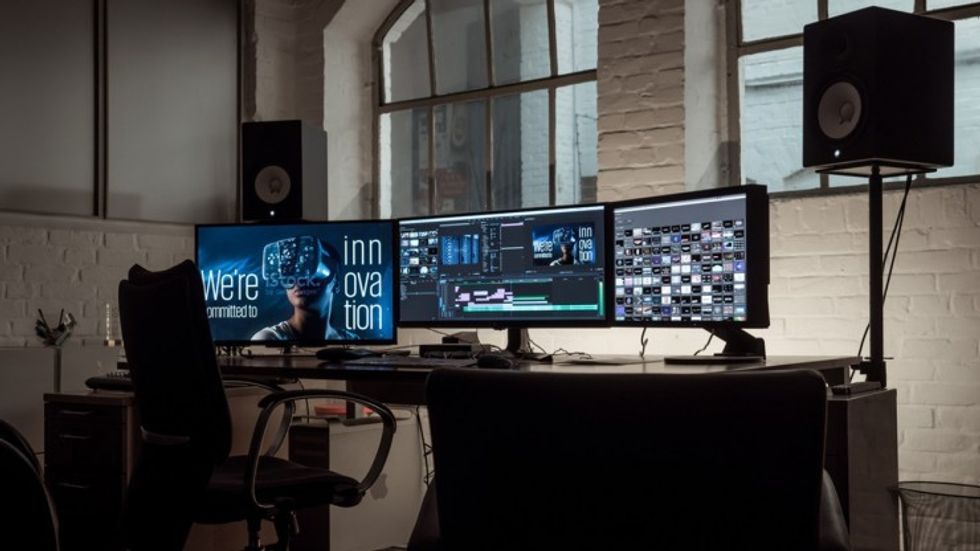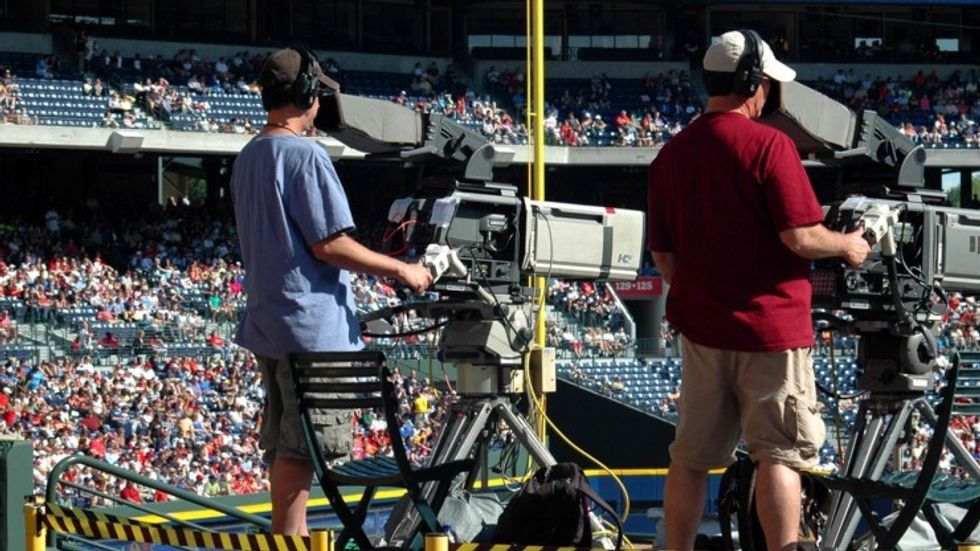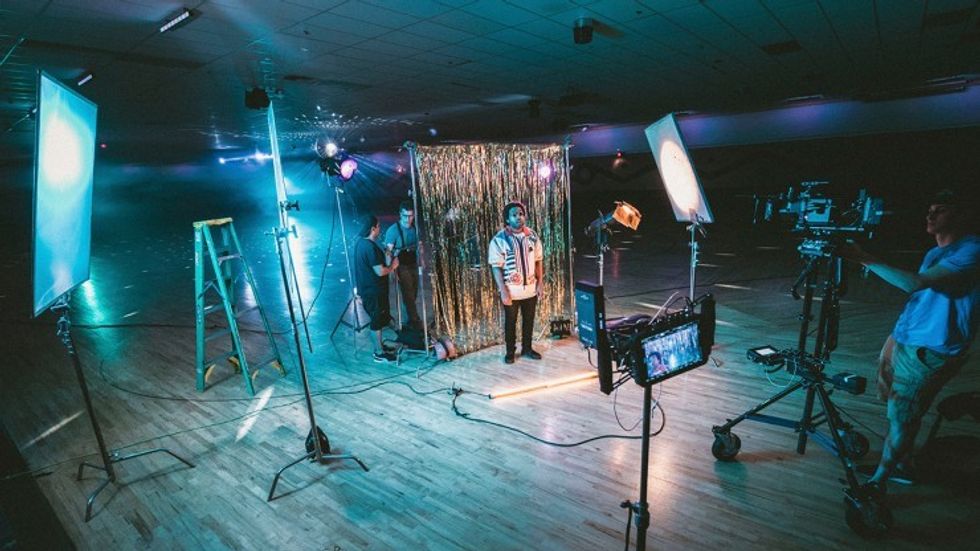Video Editor Jobs Are Everywhere, Here's How I Found The Right One
Breaking down the many career paths and opportunities available to video editors.

In a recent article I wrote about starting, building, and rebuilding a career as an editor. But I also pointed out there are many video editing jobs that aren’t necessarily in film and unscripted tv.
In this post I’m going to expand on that, putting together a list of different video editor jobs in different fields.
Note that this list will only cover a fraction of what’s out there for a freelance video editor. Not so long ago, having a professional editing system required a massive capital investment, but as options have opened up and costs have plummeted, a working editor today might be making a living on their home computer, or may find yourself commuting every day to a large facility with a shared-storage network feeding footage to dozens of edit bays. The options are numerous and vary widely. Video production in general is everywhere.
But I’ll begin with one warning.
Video Editor Job Pigeon-holing is Real
It’s not impossible to break out of one field of editing and into another, but it’s usually challenging. So my recommendation is to follow standard scuba diving procedure: plan your dive, and dive your plan.
In other words, figure out where you want to end up and take the steps that will lead you in that direction. Missteps can always be corrected, and all editing experience is valuable. But if your passion is documentary work, that should be your focus. Want to edit game shows? Or start a business editing wedding videos? Those are very different paths, so adjust your focus accordingly.
Figure out where you want to end up and take the steps that will lead you in that direction.
Next, realize that there are staff editing jobs, and freelance editing jobs. Freelance editing will lead to a wider range of work, and day rates are usually higher than steady gigs. But freelancing also means constant uncertainty, and you’re always looking for the next job. That goes hand in hand with more freedom and flexibility. Staff gigs will usually have standard hours, and bigger companies might even have retirement plans and benefits.
In the interests of full disclosure, my primary experience is in unscripted TV, with some narrative features as well. I’ve dabbled in many other editing jobs over the past two decades, but some of these listings will have more detail than others. I simply can’t know enough about all these options to provide useful advice for all of them.
Let’s begin with the obvious editing jobs: narrative film and tv, unscripted television, and documentaries. These are all very different beasts, with different jobs available.
Feature Film Video Editing Jobs
The traditional path was to work your way up from assistant editor to senior video editor. But the days of assistant editors working side by side with editors, physically cutting and splicing film, are over. Even movies shot on film are then digitized and work is done on an Avid, more often than not. Breaking into film editing will take a tremendous amount of hustle and a good dose of luck. Editing an independent film that breaks big is great, but you can’t count on that.
I’d strongly suggest cutting short films and branching out to make as many contacts as possible.
Feature Film Assistant Editor Jobs
Also important to note is the role of modern assistant editors. Being an assistant editor on feature films can be a lifelong career. It’s a challenging job that requires immense technical knowledge, and good feature assists can earn as much money as scripted TV editors.
Being an assistant editor on feature films can be a lifelong career.
Plus, union assists get overtime… while union feature editors do not (though they’ll have a higher base salary). To get into this line of work, you’ll likely begin as a post-production PA or an apprentice editor. Work hard, learn your craft, and if the crew you’re working with respects your work, you’ll be able to move up the ranks over time. Like almost all jobs in feature films, your job is over when the project wraps, and you’ll have to look for the next gig. Think of it as long-term freelance work, where jobs can last anywhere from six months to two years.
Documentary Video Editing Jobs
These range from massive, multi-year projects – Ken Burns, anyone? – to small micro-slices of life that can be told in a minute or two and edited quickly. There’s even a YouTube channel devoted to 60-second documentaries.
Like many editing projects, where and what you’re cutting will affect whether you’re freelance or staff, and what your pay scale will be. But in general terms, documentary editing is a cross between news editing and unscripted tv. You’ll need to tell a story with the footage you have, it will need a beginning, middle, and end. And it will require tremendous organizational skills by the editor and director. Assistant editors will also have to be masters of organization, especially for larger projects.
Television Video Editing Jobs
To begin, this will focus on national networks, not local channels. I’ll get to those in a bit.
In the television world, there’s a big chasm between unscripted (“reality tv”) editors, and scripted editors working in either dramas or sitcoms. And while there may be more prestige in the scripted world, oftentimes reality tv editors make more money. Both are challenging jobs in different ways.
Being a reality editor is often a blend of editing and writing. You have to find a story within the existing footage, and the story requires drama, tension, and resolution. You’ll usually have story producers that work with you to craft the story, but the specific difficulties of the job mean experienced editors get paid well.
In this world alone, there are many strata of subdivisions. These include (but aren’t limited to):
Competition shows: Iron Chef, Face Off, American Ninja Warrior
Docudramas: Real Housewives, Ice Road Truckers
Shiny Floor Shows: America’s Got Talent, The Voice
And having credits one of those doesn’t mean producers of the other styles will be keen to hire you. So in this field, do what you can to diversify and build up a range of show-styles.
These jobs are all freelance, and jobs can last from a few weeks to many months for shows with longer seasons.
Most smaller reality shows are non-union, while the larger shows are often union jobs. If you want one of those, you’ll have to build up editing hours on non-union shows until you qualify to join the editor’s guild.
Other TV jobs include working on talk shows: cutting comedy bits for late night shows, or intro packages for daytime “Dr. so-and-so” shows. These jobs can be freelance, or occasionally staff jobs. Many of the late-night talk shows have editors that stay on for years, often until the editor or host retires, whichever comes first.

Game Show Video Editing Jobs
Like every other category here, it’s hard to get into game shows if you haven’t cut them before. The old catch-22. But if you get a foot in the door, there are always new game shows to edit. Getting your foot in the door as an assistant editor is a good way to start.
News Editing Jobs
Be it for a national news broadcast, local news, or news shows like “20/20” and the like. If this is your interest, starting in a smaller market would be a great way to get a foot in the door and build experience. Even smaller cities usually have their own local news channels. Get experience there before eyeing bigger markets, if that is your goal. But while bigger markets pay more, they often come with higher cost-of-living, so staying in a smaller market could be a viable long-term plan to earn a living as a news editor.
Scripted TV Video Editing Jobs
The scripted world is also very challenging, but radically different from unscripted TV. You’re not finding the story and building the moments from scratch. Instead, the focus is more on building powerful performances, or emphasizing the comedy, making the story flow and the pace work.
Scripted TV can range from network dramas (Law & Order, CSI) with long seasons and a large audience, to cable dramas – everything from Netflix, Amazon, FX, HBO, Hulu, etc. – that have shorter seasons and are often serialized stories.
And there are also sitcoms, some of which are shot with multiple cameras in front a live studio audience – such as The Big Bang Theory or Will & Grace -- and others are single-camera comedies like Modern Family or The Good Place that are edited like traditional films.
Getting into any of these, if you don’t already have similar credits, will usually mean starting as an assistant editor. When looking for new editors, producers will often turn to assistant editors who already know the show and style and give them a shot. It may take some years to get that opportunity, but it’s a great way to get in the door.
In almost all cases, these are going to be freelance jobs, where you’re hired for one season at a time.
What if I Live in a Smaller Market?
But wait – what if you don’t like in a major TV editing market like Los Angeles? Can you still make a living as an editor?
Yes. Yes, you can.
Lots of industries require video editing services, and while this will not be a complete list by any means, consider it a jumping-off point. You’ll have to find your own area of interest and do some research and hustling to get your foot in the door, there’s no way one article can point you to the best options in your specific market.
YouTube – It’s a massive marketplace, and content needs to be edited.
Pros? If you find the right people, this could be a great remote editing job. Larger channels may require you to work locally at their facility, though. There will also be many opportunities for beginners here.
Cons? Odds are it won’t pay well. Still, experience matters and editing for a YouTube channel can be a great way to earn some.
Commercials – National spots are generally going to be cut in a major market. But every market has its own local advertising, and those commercials need to be edited. Look for local production companies, or local post-production facilities, to get access to this market. One director I know even commented on a massive production studio in a small town. He was there to shoot an indie film and spent some days at their amazing facility. He discovered they made most of their income specializing in political ads. May not be the right job for the pure-at-heart, but hey. A gig is a gig.
Music Videos – They aren’t what they used to be. Labels aren’t making videos for “baby bands” at the start of their careers these days. But, many indie bands make their own videos. It’ll be low-budget land, but the opportunity to grow is there. And consider foreign markets. Many non-English-speaking bands still make music videos with smaller-but-workable budgets. If you speak another language, this could be a good opportunity for you.
Local News – The big networks have national news broadcasts every night, but even small cities often have their own local news programs. And if they are on screen, they need editors. Contact the news stations directly to find opportunities here. On a personal note, I filled in for a local news station for a week once, many years ago. Their regular editor was on vacation.
I edited a couple of news packages, but for the most part, I had a lot of down time. A solid 80% of my time there was “we need a body just in case.”
The “just in case” happened exactly once, when I had under 15-minutes to digitize a tape (tapes were still a thing then), cut a segment, output back to tape, and get it to the control room before a live broadcast. It was a brief bout of intensity in an otherwise slow week. Clearly, individual experiences will vary greatly depending on the market.
Corporate – Corporate videos are a huge market, and you can work from just about anywhere. I know one editor overseas who specializes in videos for liquor distilleries. He also shoots his own footage. Keep that production option in mind, because perhaps a better market for you is to be a start-to-finish production source, with a couple of decent cameras, some good microphones, a lighting package… and you can then edit your own pieces. This will require a higher level of technical expertise, plus a larger capital investment, but it can open up a world of opportunity if you find the right market. You can then market yourself as a "preditor" or "producer-editor" which is an emerging role.
Weddings – Capturing and editing one of the most important ceremonies of someone’s life. I’ve seen great wedding videos and awful wedding videos. Guess what? Both require editors. But hopefully, you’ll aim to make the former, not the latter. And like corporate video work, you can always expand and handle the process starting at the production level.
Sports Production – One colleague of mine, tired of the Los Angeles grind, moved to a Midwest town and ended up in sports production. He’s moved steadily upwards in the field and loves what he does. He’s worked for the NFL network, editing and producing highlight packages. For an individual NFL team, editing and producing TV shows, web content, commercials, and the like. He’s also worked for a University doing the same for their teams. He is now working for a professional soccer team as their producer/editor. As he says, “Every city has sports teams or sports television production that people can get into by just simply being around and networking with other people involved in that industry. Very easy to get internships and then freelance work.” Note that he does a lot of producing as well, so be prepared to wear multiple hats if you go this route. He’s also moved quite a lot, as each job has taken him to a new city.
And there you have it. Are there other options I haven’t covered? Absolutely.
But if you’re looking into options, pondering ways you can pay the bills as an editor, hopefully, this will spark some ideas. In the end, it will always take a healthy dose of networking and individual effort to break into any new market, however big or small. Remember just because your start as an editor doesn't mean you can't become an editor and more. There are "preditors" and "shreditors" out there, explore both those roles if they interest you.
Keep at it and find your path.














